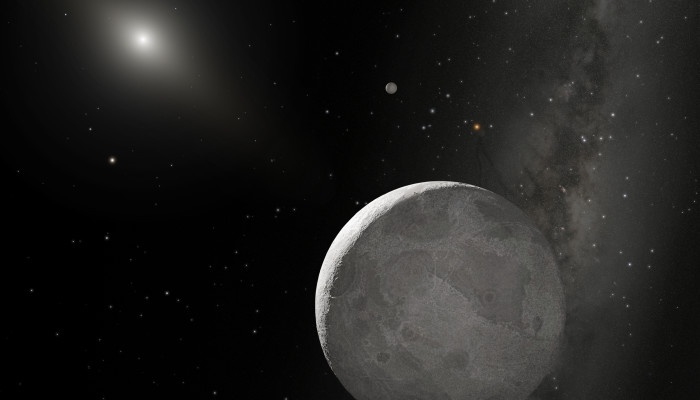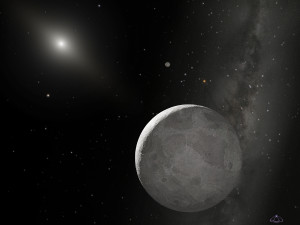
Searching for IQ-13
 There’s just no telling what people will do next in the name of science.
There’s just no telling what people will do next in the name of science.
Recently I had the opportunity to talk with Otis Schindler, PhD, professor of astrophysiology at Hauer University. As reported in The Wall Street Journal late last year, he and a small team from NASA have been working feverishly on developing a mass-destruction agent that operates as both an implosive and an explosive. The project has led to the development of Illudium Q-13, and now they are excitedly seeking appropriate test sites.
Not surprisingly, having no preexisting agent that functions as they hope IQ-13 will, testing sites are in short supply. After all, who wants to implode/explode their own property? So, this being NASA, and mass destruction agent testing being what it is, Dr. Schindler, NASA, and Hauer U. have trained their eyes on poor, defenseless, reduced-to-non-planet status Pluto. (You can tell where my initial sympathies lie.) At any rate, the conversation with Dr. Schindler was enlightening, for reasons I’ll elucidate later.
You can imagine my surprise when I asked Dr. Schindler “Why Pluto?” and his immediate (and rather curt) reply was “Why not?” Since its discovery in 1930, Pluto has been the beloved underdog: the tiny, lonely planet with a Mickey Mouse name. But when pressed, Dr. Schindler gave a response that made a bit more sense.
As many of us have heard in the last two decades, Pluto’s planetary status has, indeed, been denied. Many scientists agree that it simply does not share the characteristics of the other “more regular” orbiting bodies in our solar system. Basically, Dr. Schindler asserts, “Pluto is really nothing more than orbiting space junk.” He further clarified by stating that if Halley’s comet (another non-planetary orbiting body) were to threaten Earth while completing its orbit, we would certainly not think twice about destroying it. Likewise with Pluto: though its orbit is regular (not passing through other orbits), it does not meet all the criteria for a specifically planetary body, and therefore we need not treat it as such.
Dr. Schindler was also quick to point out that the experiment is twofold: to test the performance of IQ-13, and to test the hypothesis that the solar system is a self-healing mechanism. (It has been postulated that if any orbiting bodies within our solar system [including our moon] were disturbed, the results would be catastrophic… a theory which, for the record, Schindler and his team think [and hope to prove] is misguided). When it comes to testing the new agent, deep space is the obvious choice; the further away we test a dangerous mass-destruction agent, the less likely we are to seriously damage our own property (i.e., Earth). No one owns Pluto; it is not a “planet”; ergo, it is a prime testing site.
The second hypothesis intrigued me a little more: how can we possibly test the self-healing properties of a system without risking irreparable damage? Dr. Schindler had a ready answer to this, too: we take this risk all the time with nuclear reactors, and those are in our own backyard.
It makes much more sense to test a mass-destruction agent completely off the Earth, and note the repercussions from a distance, rather than, as one of his colleagues suggested, “shooting the moon” and proving (much closer to home) that the self-healing hypothesis was wrong.
Unfortunately, we won’t know for quite some time whether or not the self-healing hypothesis is true, or whether the IQ-13 will perform as intended as the first Plutonic space probe won’t reach the “orbiting space junk” for another seventeen years. And when I asked if the IQ-13 was on the first probe, Dr. Schindler indicated that to share such information might risk congressional budget cuts for the project. So it’s wait a few decades and see.
In the meantime, I admit I was stricken by the positive spin that Dr. Schindler and his team have put on the research and development of new destructive agents. For once we’re not testing them on ourselves, and for once science has done something constructive with data that proves they were wrong: they originally thought Pluto was a planet; they discovered they were mistaken, so they’re getting rid of the evidence.
Sounds like a plan to me!
Copyright © Kellen Talbot